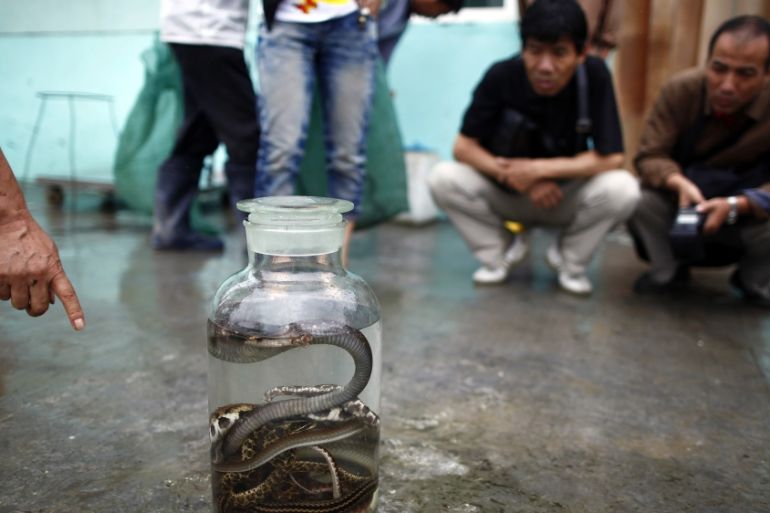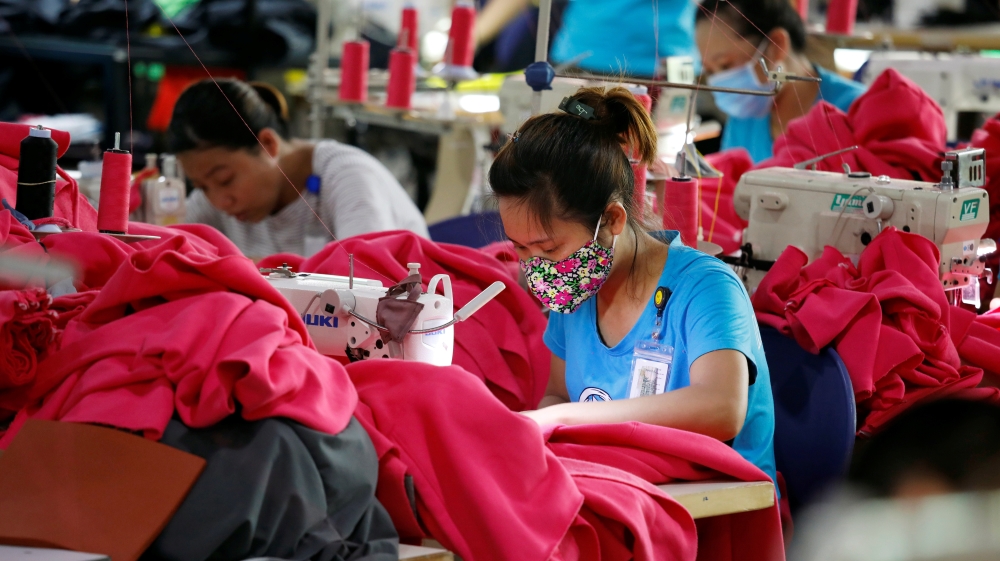Planes, snakes and credit cards: More businesses hit by virus
Singapore Airlines cuts capacity, United removes guidance and China bans wildlife trade as the virus hits supply chains.

Business risks due to the coronavirus outbreak are rising globally as United Airlines shelved its financial forecast for 2020, Mastercard Inc warned of lower revenue and China shut down wildlife trade in the country.
Singapore Airlines also cut 10 percent of its capacity, froze recruitment for ground positions and deferred spending, grappling with lower travel demand as the number of coronavirus cases increased outside China.
Keep reading
list of 3 itemsAsian shares struggle to bounce back as coronavirus worries surge
Coronavirus deaths in Italy rise to 11
In the United States on Monday, United Airlines withdrew its full-year financial guidance for 2020, citing heightened uncertainty over how the duration and spread of the coronavirus to other regions could hit overall air travel demand.
In a regulatory filing, the company stuck to its forecast for the first quarter thanks to cost savings including lower fuel costs and said it believes it will be able to deliver earnings growth in 2021.
United also said if the virus runs its course by mid-May, and normal travel patterns on trans-Pacific routes resume gradually over five months, it would expect to achieve its previous 2020 earnings forecast of between $11 and $13 per share.
Near-term demand to China has almost disappeared and demand to the rest of its trans-Pacific routes has dropped by 75 percent, United said.
Meanwhile, Singapore Airlines temporarily suspended more than 3,000 flights from February to the end of May, accounting for 9.9 percent of the group’s scheduled capacity, according to a memo sent to staff.
“We will continue to be nimble and flexible in adjusting our capacity to match the changing demand patterns in the market,” Chief Executive Goh Choon Phong said in the memo, first reported by the Straits Times newspaper.
“We have also proactively reached out to our suppliers and partners to discuss additional mitigating measures during this difficult time,” he said.
The airline added on Tuesday that it was closely monitoring the situation and would adopt additional measures if needed.
Lost revenue
Payment systems providers are also being affected, as Mastercard said on Monday that its net revenue in the first quarter will take a hit of between 2 percent and 3 percent compared with its previous forecast if the coronavirus outbreak persists through the quarter.
The company now expects revenue growth between 9 percent and 10 percent in the current quarter as the virus impacts travel and e-commerce across borders.
The credit card issuer also expects that net revenue growth on a year-over-year basis in 2020 would be at the low end of the low-teens range if the impact of the virus is limited to the first quarter only.
The virus has killed 2,663 and infected 77,658 people so far in China, and slammed the brakes on the world’s second-largest economy.
In Vietnam, a close trading partner of China, garment makers warned of a severe shortage of materials starting in the second quarter because the coronavirus outbreak has disrupted supply chains, the chairman of the Vietnam Textile and Apparel Association said on Tuesday.

“Domestic firms have sufficient materials for production until the end of the first quarter, but many of them will face severe shortage of materials from the second quarter because they have trouble importing materials from key suppliers in China, Japan and South Korea,” Vu Duc Giang told Reuters.
Giang said more than 50 percent of materials for the country’s garment industry are shipped from China.
“We don’t know yet to what extent the coronavirus will impact Vietnam’s garment output this year,” Giang said, in a phone conversation. “But we expect garment output in the first quarter to stay flat from a year earlier.”
Giang said several garment makers will have to cancel or delay deliveries of their products.
“We are trying to diversify our sources of materials to mitigate the impacts of the virus,” Giang said, adding that some companies are making more face masks and medical protective gear.
Wildlife ban
Meanwhile, China’s top legislature said it will immediately ban the trade and consumption of wild animals, in a fast-track decision it says will allow the country to win the battle against the coronavirus outbreak.
The announcement, made late on Monday according to the official Xinhua News Agency, comes after an initial suspension of the trade and consumption of wildlife in January.
Scientists suspect, but have not proven, that the new coronavirus passed to humans from animals. The disease has now killed almost 2,700 people in China and spread to countries around the globe.
Some of the earliest infections were found in people who had exposure to a wildlife market in Hubei’s provincial capital Wuhan, where bats, snakes, civets and other animals were sold.
“There has been a growing concern among people over the consumption of wild animals and the hidden dangers it brings to public health security since the novel coronavirus disease (COVID-19) outbreak,” said Zang Tiewei, a spokesman for the top legislature’s Legislative Affairs Commission.
Zang said it was both urgent and necessary for the decision to be made at the “critical moment for the epidemic prevention and control”.
The decision, made by the National People’s Congress, stipulates the illegal consumption and trade of wildlife will be “severely punished” as will be hunting, trading or transporting wild animals for consumption.
The use of wild animals for non-edible purposes, including scientific research, medical use and display, will be subject to strict examination, approval and quarantine inspection.
Before the announcement, traders legally selling donkey, dog, deer, crocodile and other meat told Reuters they planned to get back to business as soon as the markets reopened.
Many academics, environmentalists and residents in China have joined international conservation groups in calling for a permanent ban. Online debate within China has also heavily favoured a permanent ban.